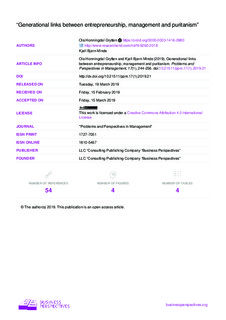| dc.contributor.author | Grytten, Ola Honningdal | |
| dc.contributor.author | Minde, Kjell Bjørn | |
| dc.date.accessioned | 2019-06-07T06:42:30Z | |
| dc.date.available | 2019-06-07T06:42:30Z | |
| dc.date.created | 2019-03-20T09:02:46Z | |
| dc.date.issued | 2019 | |
| dc.identifier.citation | Problems and Perspectives in Management. 2019, 17 (1), 244-256. | nb_NO |
| dc.identifier.issn | 1727-7051 | |
| dc.identifier.uri | http://hdl.handle.net/11250/2600232 | |
| dc.description.abstract | This paper deals with relationships between puritanism, management and entrepreneurship. As this is an on-going debate among economic historians, it focuses on the
period from the early 1800s until present times, where Norwegian high profile puritan entrepreneurship serves as the case.
The theoretical framework is that entrepreneurship is seen as an important liaison factor representing multifactor productivity in a Solow growth model. The paper provides new insight within different areas on the basis of utilization of available sources. Firstly, it gives new estimates of the entrepreneurship of the puritan leader, Hans Nielsen Hauge (1771–1824).
Secondly, it organizes his followers in three generations. The first is those who directly took up his heritage, i.e. Haugeans. Their heydays lasted until the middle of the 19th century. The second generation is characterized as Haugean descendants. These were highly influenced by the movement’s values. They dominated the scene from the late 1800s to the late 1900s. The third generation is called Neo-Haugeans, largely a fruit of the revival of Haugean values during the last decades.
Thirdly, the paper maps attributes and motivation of this puritan entrepreneurship during generations. The authors conclude that it was guided by high degree of innovation, family ownership, wide portfolios, and continuity, when stewardship seems to be an important motivational factor | nb_NO |
| dc.language.iso | eng | nb_NO |
| dc.rights | Navngivelse 4.0 Internasjonal | * |
| dc.rights | Navngivelse 4.0 Internasjonal | * |
| dc.rights.uri | http://creativecommons.org/licenses/by/4.0/deed.no | * |
| dc.subject | management | nb_NO |
| dc.subject | entrepreneurship | nb_NO |
| dc.subject | puritanism | nb_NO |
| dc.subject | economic growth | nb_NO |
| dc.subject | economic history | nb_NO |
| dc.title | Generational links between entrepreneurship, management and puritanism | nb_NO |
| dc.type | Journal article | nb_NO |
| dc.type | Peer reviewed | nb_NO |
| dc.description.version | publishedVersion | nb_NO |
| dc.subject.nsi | VDP::Social science: 200::Economics: 210::Economics: 212 | nb_NO |
| dc.source.pagenumber | 244-256 | nb_NO |
| dc.source.volume | 17 | nb_NO |
| dc.source.journal | Problems and Perspectives in Management | nb_NO |
| dc.source.issue | 1 | nb_NO |
| dc.identifier.doi | 10.21511/ppm.17(1).2019.21 | |
| dc.identifier.cristin | 1686184 | |
| cristin.unitcode | 191,30,0,0 | |
| cristin.unitname | Institutt for samfunnsøkonomi | |
| cristin.ispublished | true | |
| cristin.fulltext | original | |
| cristin.qualitycode | 1 | |

